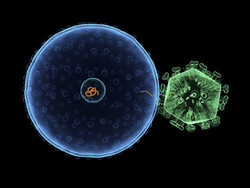Advanced algorithms predict host-pathogen interactions
Hepatitis C is a major infectious disease caused by the hepatitis C virus (HCV) and affects more than 250 million people worldwide. HCV infects the liver and can persist over the years leading to chronic infection and serious liver diseases such as liver cirrhosis and cancer. Currently, there is no vaccine available and standard treatment consists of antiviral and immunomodulating regimens. However, this therapy works only in some patients, necessitating improved understanding of HCV infections to advance medical treatment. The SYSPATHO (New algorithms for host pathogen systems biology) project focused on the development of novel mathematical methods and algorithms that could be applied to systems biology. As a paradigm, these methods were applied to study the complex interactions of HCV. Project partners built their model by integrating and analysing data from wet lab experiments, databases and biological literature. The aim was to reconstruct and study intracellular interaction networks required by the virus. A bottom-up approach used current knowledge about the signalling network. Conversely, a top-down approach selected model components from all possible molecular interactions. Combined with advanced experimental techniques such as live imaging of cells and molecular interaction determination, the SYSPATHO method unveiled the dynamics of HCV infection and host responses. New data generated during the project helped identify a number of proteins involved in the HCV innate immune network with special emphasis on the interferon (IFN) response. Integrating this data into the SYSPATHO mathematical model enabled analysis of the determinants of chronic infection. Moreover, the project researchers identified the factors involved in the inhibition of HCV replication under IFN treatment. Mathematical methods developed during the project can solve highly non-linear continuous and discrete equations and can analyse models to a more sophisticated level. Improvement of methods by SYSPATHO could also verify the reliability of parameter estimates and solve the inverse type problems of mathematical modelling. SYSPATHO has identified new candidate host cell target genes for the design of novel anti-viral drugs against hepatitis C. Apart from HCV, the SYSPATHO mathematical methods are also applicable in the broader area of systems biology.







